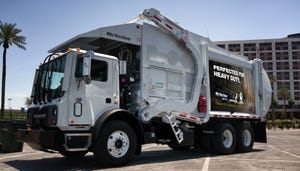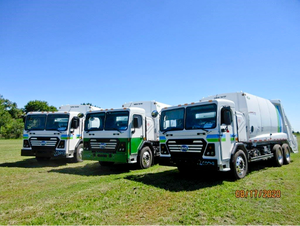Paine's Recycling And Rubbish Removal: "The Three S" Policy
November 1, 1997
Jack Friedline,
For the past 69 years, Paine's has been building its excellent reputation for quality work and reasonable prices. Our biggest asset is our employees who continually allow us to raise the bar of quality service. We constantly monitor costs, but never lower the quality of service.
Our motto is the "Three 'S'" policy:
* Satisfaction - doing the job right the first time.
* Safety - for all customers and employees.
* Specifications - use the proper equipment to do the job well.
The improvements we have made in the last 10 years include evolving from manual to automated residential collection, adding two additional operating personnel and changing commercial collection from rear-loading to front-loading containers. In addition, our customers now can pay conveniently by credit card which helps us with cash flow.
Commitment to the "Three S" policy begins at the top and extends throughout the company. Everyone is aware that their paycheck is generated by the customer and that it originates with customer satisfaction. Our management believes in regarding our employees as customers, who must be satisfied through training and by Paine's providing them the best tools to do their job.
In turn, we regard our suppliers and clients as customers who deserve our consideration and cooperation. A cooperative vendor is always preferable than one that offers blame and excuses when equipment fails. We call on the former type and work with them closely to iron out problems.
We need fewer types of parts since we standardized our equipment - a situation that has resulted in easier problem diagnosis, speedy repairs and happier workers and customers.
The recipe for improvement is employing good people and providing them with the right tools. Mix in clear directions and proper training and be on the constant lookout for new ideas, tools or technology.
Goals are not static; they evolve over time. Thus, we monitor ourselves constantly, adjust as necessary and communicate with our team to keep them involved. At minimum, we review our overall plan annually to insure that it still reflects both our short-term and long term goals.
Success is not rated by the bottom line. We look at customer complaints and comments, as well as feedback from our employees as an indicator of how we are doing. The longevity of our customer and supplier base is another measurement. Membership in industry boards and councils serve as benchmarking opportunities, as well as information sources.
Modernizing our equipment has increased our workforce longevity, due to the reduced injuries and increased motivation. Once we standardized our fleet, we enjoyed lower repair costs, less stocked parts and better supplier service.
Computerization of our office equipment, workforce training and the easier feedback from customers, suppliers and workers, has allowed us to provide better service with a more responsive, sympathetic attitude.
All this enables Paine's to meet - and defeat - increased competition native to the waste industry.
1. Define the proposed job. How large is the area and what type of services are needed? How many stops? What types and quantity of materials are being produced and what kind of changes are foreseen? What types of services are being performed, how is it perceived and what changes would you institute? What would be the cost to you and your customer?
2. Be honest about your capabilities. If you fail because you bite off more than you can chew, that becomes part of your resume. If, after careful consideration of the facts, you believe the venture is too risky, then back off and wait for another opportunity. Many a smaller company has floundered on the rocks of over-reaching ambition.
3. Communicate with staff and customers. Who knows you exist if you don't tell them? Communicate with employees about what you expect and review their performance. Also, keep in touch with your customers about your services, policies, problem solving, how you stack up against the competition and that you value their patronage. Happy, satisfied customers are your best advertisement.
4. Tune in to industry developments and opportunities. Knowing what is going on and other's perspectives means reading a lot, subscribing to trade magazines or spending a few hours a week in the library. Or, it might be a matter of attending trade shows, if feasible, and joining local association chapters. Simply knowing about new equipment, procedures or processes may mean that extra competitive edge you need.
5. Network. Networking may give you leads on opportunities, create helpful allies and can advertise your business. Writing, public speaking and volunteering can earn you the distinction of being an expert in your field. Even if you are a public employee, you still have to sell yourself to your employers, the public.
6. Avoid complacency. You can't be competitive if you don't have a zest for your job. You are the greatest competition you face. Ask yourself, "What can you do that is better than you have done so far?" It may be simply tweaking something or turning your operation upside down. Or, it may be discovering there is nothing for you to do immediately.
You May Also Like


